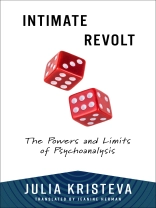Julia Kristeva, herself a product of the famous May 1968 Paris student uprising, has long been fascinated by the concepts of rebellion and revolution. But is it still possible to build and nurture a culture of revolt in today’s world? In this book, Kristeva examines the manner in which three of the most unsettling modern writers—Louis Aragon, Jean-Paul Sartre, and Roland Barthes—affirmed their personal rebellions. She then ponders the future of rebellion, maintaining not only that political revolt is mired in compromise but also that an essential component of European culture—a culture of doubt and criticism—is losing its moral and aesthetic force.
Inhaltsverzeichnis
Translator’s Acknowledgments
Part I. Intimate Revolt
1. What Revolt Today?
2. Can Forgiveness Heal?
3. The Scandal of the Timeless
4. The Intimate: From Sense to the Sensible (Logics, Jouissance, Style)
5. Fantasy and Cinema
6. Barthes: The Savor of Disenchantment
7. Barthes: Constructor of Language, Constructor of the Sensory
8. Barthes: The Intractable Lover
9. Sartre: The Imaginary and Nothingness
10. Sartre: Freedom as Questioning
11. Sartre: Again, the Imaginary, Fantasy, Spectacle
12. Aragon: Blanche ou l’oubli; or, “The Farcical and Ferocious Quest for a Consciousness”
Part II. The Future of Revolt
Preface
13. Psychoanalysis and Freedom
14. The Love of Another Language
15. Europhilia-Europhobia
Notes
Index
Über den Autor
Julia Kristeva is professor emerita of linguistics at the Université de Paris VII. A renowned psychoanalyst, philosopher, and linguist, she has written dozens of books spanning semiotics, political theory, literary criticism, gender and sex, and cultural critique, as well as several novels and autobiographical works, published in English translation by Columbia University Press. Kristeva was the inaugural recipient of the Holberg International Memorial Prize in 2004 “for innovative explorations of questions on the intersection of language, culture, and literature.”












